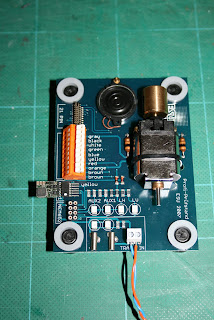In the picture below you can see a Lenz Silver Mini Direct decoder plugged in at the left hand side. I have two of these in my new Farish Derby 108 DMU (one for each car).

In the next shot you can see a Lenz Silver Mini with cable harness hooked up to the sprung terminals. This will be going in my class 45 'Peak' diesel conversion. The tester is connected to the 'PQ' programming track output on the DCC command station and the decoder is being 'read'. The handset is displaying '0003' which is the factory set default address for all DCC loco decoders, so all is well. Programming track outputs are at very low current so no damage can be done if you've fluffed your installation. The motor should 'pulse' three times for a few revolutions as it is being read. If you get an 'ERR' error message you have probably got a duff chip, but check your connections are good first!

The tester can then be connected up to the main track outputs from the command station and the decoder can be played with. The tester has tiny LED's that can prove that 'F0' lighting functions/directions are working correctly. Other functions such as the 'F3' half speed-range shunting mode setting are also tested. I consider it £29.50 well spent. Any DCC retailer worth his salt should have one of these and use it to test decoders before despatch!

No comments:
Post a Comment